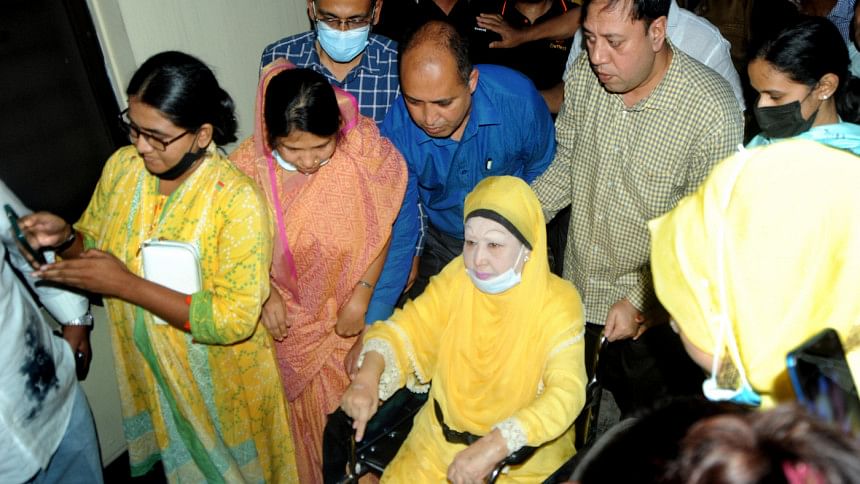The legal case against Khaleda’s treatment abroad is far from convincing

The government has turned down Khaleda Zia's family's application to allow her to be taken abroad for urgent treatment, which her lawyer and her party leaders have termed as a political vendetta. The government's reasoning, as explained by Law Minister Anisul Huq, was that the application, on which the government has suspended the jail sentence of Khaleda Zia and released her from jail on two conditions, has been disposed of and has become a "past and closed transaction." The minister also said that the decision to suspend her sentence was made under Section 401(1) of the Code of Criminal Procedure (CrPC).
This refusal to allow treatment abroad could not have come at a worse time, as the former prime minister's continuous illness has reached a critical stage, with life-threatening conditions. Besides, political distrust and division in the country over the coming election, too, have become highly charged. Against this context, it is hard to discard the notion that politics played no part in this decision from the government.
It is still unclear what rekindled the hope of her family and party that the BNP chief's treatment abroad could be possible, despite the fact that several attempts in the past have been flatly rejected by the government, citing the same law and argument which the law minister has referred to in his latest legal opinion. Reportedly, Khaleda Zia told her partymen not to agree to participating in the next parliamentary election under the current government in exchange for her medical care abroad.
It, therefore, begs this question: was the life of a politician, of such stature, really made a bargaining chip by either of the parties? The question became even more pertinent when the law minister, responding to reporters' queries on September 24, said that the government did not receive any application from her family seeking permission to take her abroad.
It followed the government's decision to extend Khaleda Zia's conditional release from prison for six more months, based on a separate application filed on September 4. As a result of the law minister's suggestive remarks that the family had not sought permission for her treatment abroad, Khaleda's younger brother Shamim Iskander made another application on September 25 seeking the required approval.
Should we believe that the issue of seeking permission afresh was brought about simply to humiliate the political opponent by reminding them of how "powerless" they are? Questions may also arise about whether the arguments of considering the petition "disposed of" and "a past and closed transaction" are tenable.
It is often said that the law will take its own course. But examples are plenty to prove that the incident at hand was simply political rhetoric. If someone compares the fate of the 78-year-old former prime minister with that of some other politicians, such as Jatiya Samajtantrik Dal leader ASM Abdur Rab, the irony becomes evident. The JSD leader was allowed to go to then West Germany for treatment while he was serving his prison term awarded by a martial law court. Another politician, Haji Mohammad Selim – who belongs to the ruling party – was not barred from travelling to Bangkok for his treatment despite being convicted and ordered to surrender, and having had a record of fleeing the country during the tenure of the caretaker government between 2006 and 2008.
Law Minister Anisul Huq said, "Once an application is disposed of under Section 401 of the Criminal Procedure Code (CrPC), there is no scope to reconsider it under the law." Many other jurists, however, do not agree with his interpretation of the law as there is nothing that bars the government or limits its authority to reconsider its decision. Every law is subject to interpretation, and there are variations in interpretations. Among these variations – except the court's interpretation – some are known as literal, and some are mischievous or intended to create mischief.
Amid the contested claims by the government and by BNP, it would be better to read Section 401 of the CrPC and draw one's own conclusion. Under the title "Power to suspend or remit sentences," the law states in Section 401(1), "When any person has been sentenced to punishment for an offence, the Government may at any time without conditions or upon any conditions which the person sentenced accepts, suspend the execution of his sentence or remit the whole or any part of the punishment to which he has been sentenced."
Additionally, Section 401(6) says, "The Government may, by general rules or special orders, give directions as to the suspension of sentences and the conditions on which petitions should be presented and dealt with." As the literal meaning of the rule is far from convincing, it would be wiser for the government to reconsider its decision, which may help improve the current political environment in the country.
Kamal Ahmed is an independent journalist. His X handle is @ahmedka1
Views expressed in this article are the author's own.
Follow The Daily Star Opinion on Facebook for the latest opinions, commentaries and analyses by experts and professionals. To contribute your article or letter to The Daily Star Opinion, see our guidelines for submission.

 For all latest news, follow The Daily Star's Google News channel.
For all latest news, follow The Daily Star's Google News channel. 









Comments